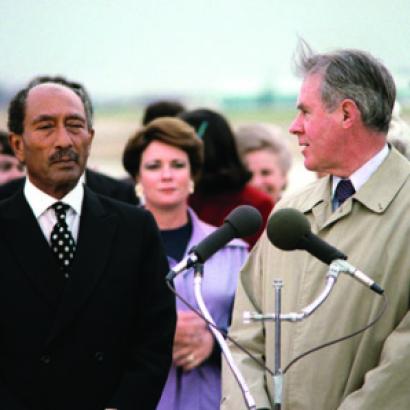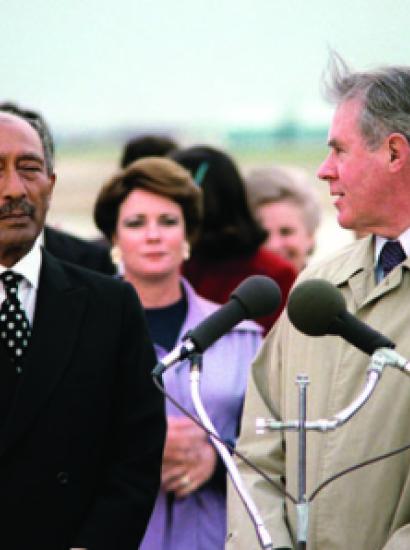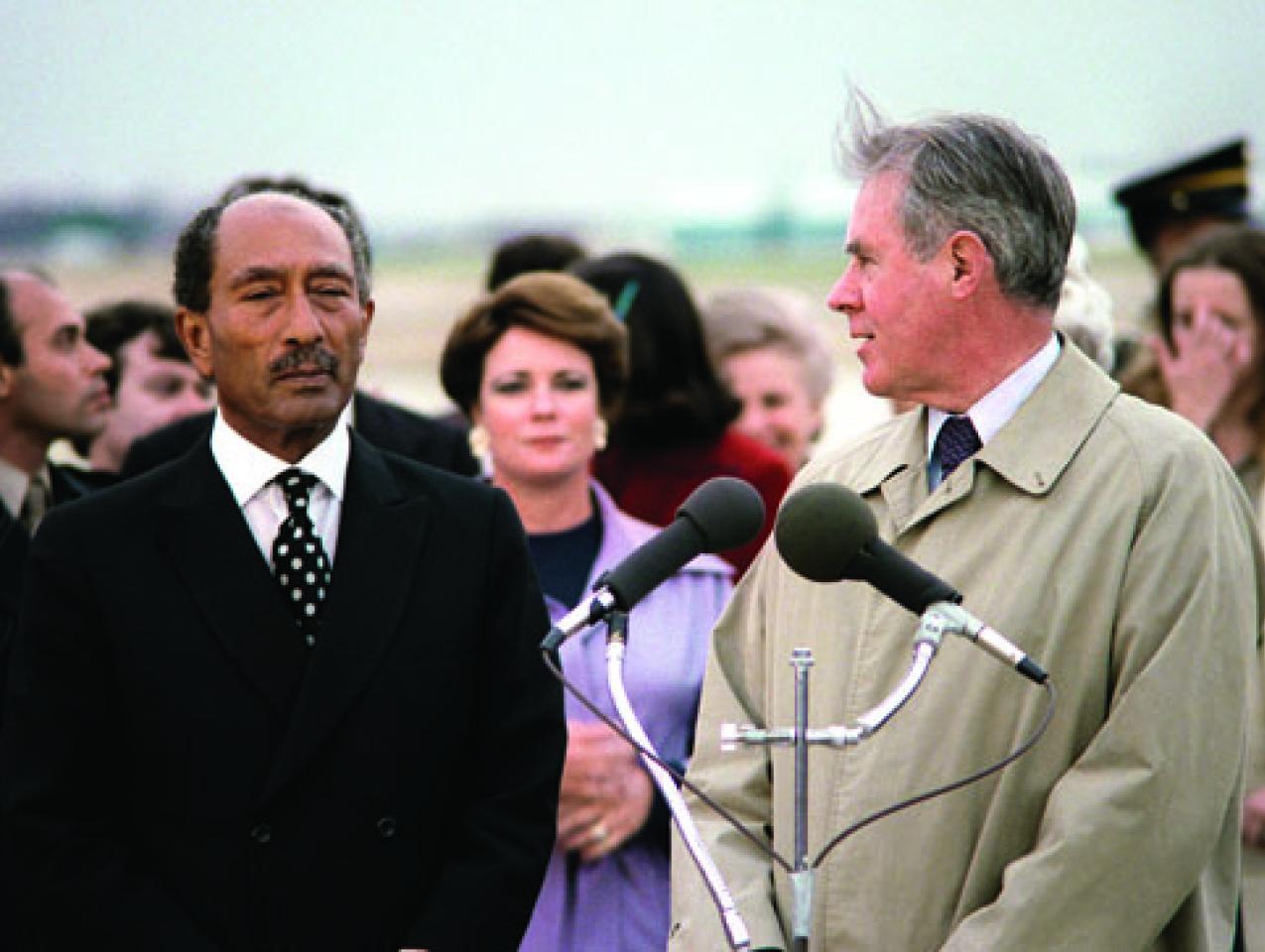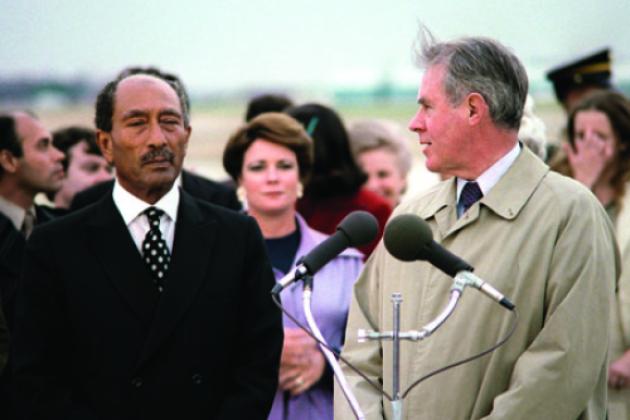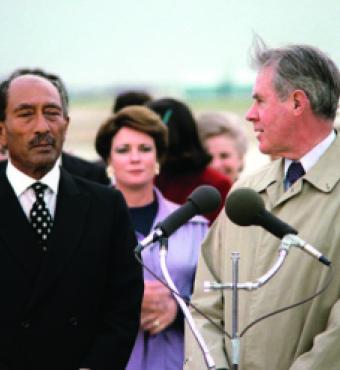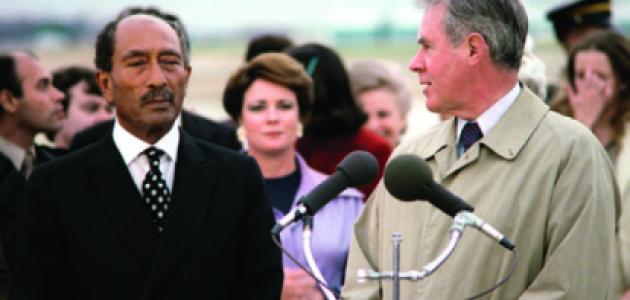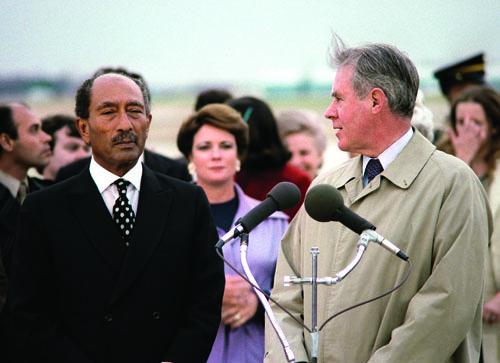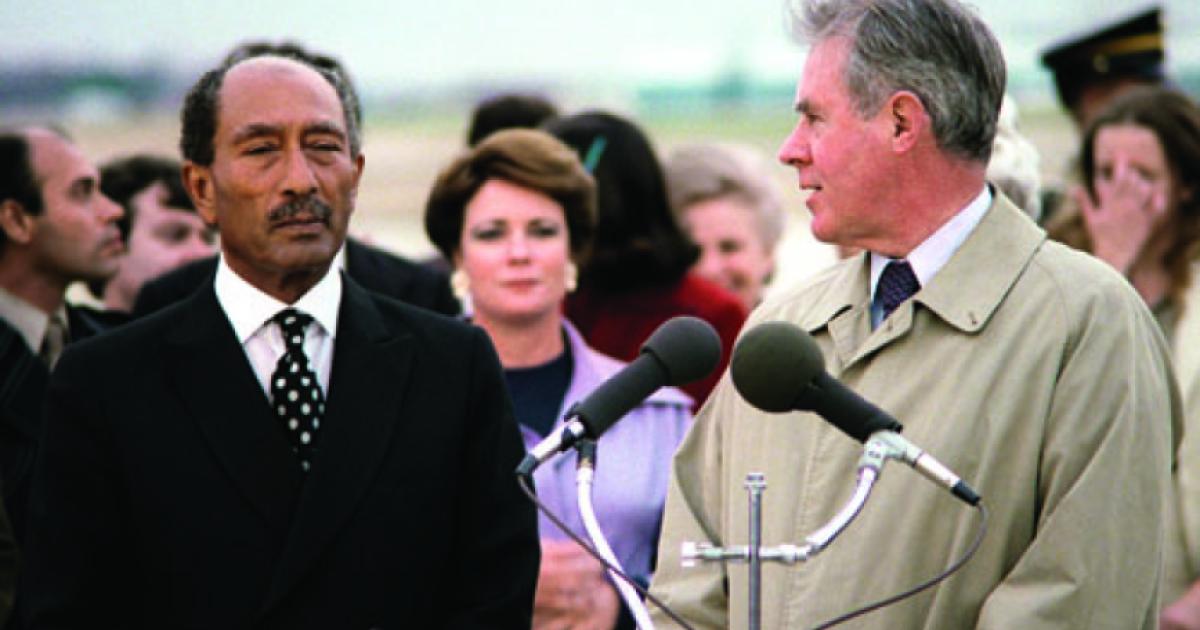- Economics
- Law & Policy
- Regulation & Property Rights
- US Labor Market
- International Affairs
- US
- Economic
- Military
- Contemporary
- World
- US Foreign Policy
- Security & Defense
- Terrorism
- History
The most consequential events affecting the problem of modern world order have been the rise of Islam, global exploration, and Europe’s state system.
First came the rise of Islam with its great Arab conquests, which were not only battle victories but also revolutionary repudiations of the Roman and Persian world orders. These were followed by the establishment of an “international” caliphate rule and eventually by a steep decline in Arab-Islamic power.
Second came the reconnaissance and exploration of the globe. Between 1000 and 1500 an Islamic world system flourished across a vast portion of the southern hemisphere. The Indian Ocean and Arabian Sea between India and East Africa were a Muslim lake until the Portuguese expedition under Vasco de Gama rounded the Cape of Good Hope and reached Calicut, India, in 1498. During the centuries of Ottoman-Christendom confrontation, European explorers visited most of the habitable regions of the globe, and nearly all those accessible by sea. They found vast territories formerly unknown to them and drew the rough outlines of the world we now know. Europeans thus came to think of all the seas as one and all the world as a whole.
Third was the development of an international state system in Europe in the seventeenth century and its spread and adoption by nations on every continent. This would become a “procedural” system, designed to forestall religious confrontations such as had inflamed the Thirty Years’ War.
Today’s problem of Islamism and world order is that Islam, the first of the above three world-historical phenomena, has been a uniate and therefore an unsuccessful and, in part, adversarial participant in the pluralistic and procedural third phenomenon.
Recent scholarship has revealed a phenomenon called the Global Renaissance. Commonly seen in recent centuries as only a process of European penetration, exploitation, and domination, these cross-cultural encounters generated material exchanges across varying power relationships and led to a complex cross-pollination of art, culture, beliefs, and technologies. The circulation of goods required the circulation of people who traveled abroad, inserted themselves in foreign communities, and returned with exotic products. Cultural understanding was crucial to successful trade.
In this process, images of Muslims proliferated in a variety of literary and cultural representations. Encounters between West and East began to belie the stereotypes. Actual interactions multiplied and complicated simplistic notions about “the Turk.” Travelers’ accounts began to combine admiration and sometimes awe with the legacy of demonization.
Out of this age of reconnaissance and renaissance came a great paradox: the recognition that mankind is unimaginably and often intractably diverse. From this reality would emerge an outline of the modern international state system designed to accommodate such diversity in a common understanding of world order.
VARIETIES OF MISRULE
The Economist of August 6, 1994, ran a special “Survey of Islam.” The cover depicted Christian knights and mounted Muslim warriors—led by Richard the Lionheart and Saladin—in battle, with the headline: “Not Again, for Heaven’s Sake,” an archetypical image of the two opposing religion-civilizations in irrepressible confrontation.
We can trace the roots of the twentieth-century phase of the confrontation at least as far back as 1914, when the Ottoman empire chose to enter the Great War on the side of imperial Germany. The kaiser’s Germany and its Ottoman partner lost, the Ottoman empire collapsed, and when in 1924 the caliphate—the sole form of overall governance of the Islamic world—was abolished, a process was set in place that would establish states all across the Arab-Islamic Middle East; none would be democratic.
In the years that followed, the Arab states would remain impervious to worldwide trends toward government by consent of the governed as region after region was swept by a wave of democratization, including:
- After World War II, when Germany and Japan, under American tutelage, turned decisively toward democracy.
- In the midcentury era of decolonization, which saw India become the world’s largest democracy.
- In the post–Cold War period, when countries in every part of the world sought open political and economic systems, and the United Nations for the first time responded by helping set up elections and democratic political institutions.
Through all these changes, the Arab Middle East resolutely remained the one region without a single democratic government. Looking back on these decades, the Arab Human Development Report of 2002—an “unbiased, objective analysis” by “a group of distinguished Arab intellectuals,” as the document published by the United Nations stated—found that the region was uniquely impaired by its own bad governance. For generations, the report found, people of the Arab world have been hindered from acquiring information and have been denied freedom of expression. Beyond that, Arab governments have suppressed the intellectual and social capabilities of half the population—Arab women. The report put it starkly: “The wave of democracy that transformed governance in most of Latin America and East Asia in the 1980s and Eastern Europe and much of Central Asia in the late 1980s and early 1990s has barely reached the Arab states. This freedom deficit undermines human development and is one of the most painful manifestations of lagging political development. . . . Fate has not decreed that political power in the Arab world should permanently exclude participation by citizens.”
The varieties of Arab misrule over the decades since the end of the First World War produced economic, social, and political pathologies that provided fertile ground for the steady growth of a revolutionary religious ideology bent on taking command of the Middle East and turning the region as a whole against the rest of the world.
What might be called the First Terrorist War was fought in the 1970s and 1980s: Israeli Olympic athletes murdered; Palestinians attempting to overthrow the government of Jordan; passengers gunned down at airline ticket counters; American embassy personnel taken hostage; the hijacking of TWA Flight 847 and the cruise ship Achille Lauro; the bombing of a Berlin discotheque.
In the 1980s, Secretary of State George P. Shultz tried to convince congressmen and media commentators that the slogan “one man’s terrorist is another man’s freedom fighter” was false and dangerous. The Reagan administration focused on how to defend against terrorism by reinforcing our embassies and increasing intelligence efforts. We thought we had made some progress. But American administrations really did not understand what motivated the terrorists or what they were out to do.
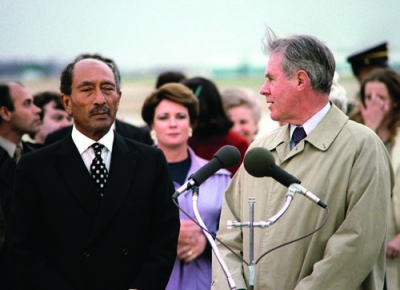
For years, American administrations failed to recognize Islamism’s role in terrorism because foreign affairs specialists assumed such acts must be politically motivated. The Westphalian credo had done its work: religion was out of the question when it came to international diplomacy.
The Foreign Service had been profoundly affected when in 1973 the American ambassador and the deputy chief of mission in Khartoum were seized at a diplomatic reception and murdered the next day. The killers came from the Palestinian group Black September and were acting, it was said, on orders from Palestine Liberation Organization Chairman Yasser Arafat. To the American diplomatic establishment, the PLO was an indispensable interlocutor in “the peace process” and its stated political objective was a “secular democratic binational state”—nothing religious about it. When Egypt’s Sadat was assassinated in 1981, American officials were simply blind to the fact that the perpetrators were Islamists; not until the 1990s, when the 1981 videos were reviewed, would the obvious Islamist role be recognized.
A CIVIL WAR OF IDEOLOGY
The attacks of September 11, 2001, were fortunate in one sense: they forced the United States to focus on the situation that had led to the attacks and on the dimensions of the challenge. The world awakened to the threat at a relatively early stage. Had the 9/11 attacks been held off for some years, further deterioration in the established mechanisms of world order might have made its defense far more difficult, even impossible.
What we have been witnessing is nothing short of a civil war in the Arab-Islamic world. On one side are those regimes in the Arab-Islamic world that, after appeasing, trying to buy off, or propagandizing the terrorists, have begun to recognize that as members of the international state system, they must find a way to reconcile their Islamic beliefs and practices with it. On the other side are those who, for Islamist ideological reasons, reject the international system of states, international law and organization, international values and principles, such as human rights, and the use of diplomacy to work through problems. The distinction between Islamic and Islamist is imperative.
Islamists follow a doctrine that cannot accept or participate in or with the international order:
- The state, as the basic unit of the international system, is by definition un-Islamic in that it fragments a people that should be one community (umma). So for Muslims to be part of the state system opens them to the charge of apostasy—and in Islam there is nothing worse.
- The state, under the international system begun with the Treaty of Westphalia, must have a secular character in its international dealings. (The 1648 treaty fostered this understanding as a way to avoid further wars of religion.) Such a secular dimension is unacceptable to Islamists.
- International law similarly is unacceptable as it falls outside and in many ways could not accommodate sharia, to Islamists the only law governing Muslims.
- Similarly, democracy, which in the modern era increasingly has come to be part of the accepted international order, cannot be tolerated by Islamists, as it requires equal justice under laws made by representatives of the people. This would amount to an ongoing violation of sharia.
- International norms and agreements on human rights, such as the rights of women, do not accord with the Islamist interpretation of sharia.
In the largest context, an unbreakable logic chain imposes an insurmountable barrier between Islamism and the established international system. Islamists claim, first, that the originating source of the international system lies in the duality expressed at Christianity’s founding: “Render unto Caesar that which is Caesar’s; unto God that which is God’s.” This division of temporal and spiritual realms is what Islam brought to an end with the message of the Prophet.
Second, they claim that the modern international order is a secularized version of this Christian duality: the separation of church and state, of public and private, and of powers with “checks and balances.” All are anathema to the unity and wholeness of Islam.
Therefore, any participation in the international order is impossible for Islamists to tolerate. As an example, Saudi Arabia, which bases its regime on the strictest fundamentalist reading of the Quran, is considered by Islamists to be un-Islamic and apostate simply because it is a state within the international state system.
Over the past two decades, four major phenomena have emerged in the Middle East and other Muslim areas, posing an interrelated set of threats to world order. First, governance in some states collapsed or lost control of parts of once-sovereign territory. This shocking and unanticipated development in international affairs called forth the then-new concept of “failed states.” Second, it soon appeared that these ungoverned spaces of the world were becoming bases in which non-state, terror-using Islamist groups could recruit, arm, plan, and train for attacks on targets in and beyond the Muslim world.
Third was the realization that governing regimes of several Arab states had turned themselves into “enablers” of these enemies of international order. The pattern, set by Saudi Arabia, involved enhanced promulgation of radical instruction, subsidies for non-state terror-using groups, and incessant propagandizing of the population to instill a semiconspiratorial, one-issue explanation narrative. What was this narrative? That all problems of the region and the faith stemmed from Israel’s oppression of the Palestinians; that the United States bore a core responsibility in that its policies were uniformly pro-Israel, Washington being under the control of American Jews; and that nothing could be asked or expected of the Arab-Islamic world in any regard until the Palestine problem is solved—the solution generally being described as the de facto end of the state of Israel through the demographic means of a Palestinian “right of return.”
The fourth phenomenon was the rise of “rogue” regimes, states that are recognized as legitimate members of the international state system and entitled to its privileges and immunities yet, at the same time, are ideologically committed adversaries of the international system. This dual role provides the “rogue” state with an on-off switch in its foreign policy: it can take a number of wrongful actions in pursuit of its own interest until, facing harsh countermeasures from the international community, it suddenly announces its readiness to negotiate or otherwise comply with normal international procedures—this in the sure knowledge that the outside world will welcome the rogue’s “change of heart.”
Over the course of many years this tactic has worked again and again as a means of neutralizing world pressure while going forward with the regime’s illicit activities. We have seen the pattern produced by Kim’s North Korea, Milosevic’s Yugoslavia, Saddam’s Iraq, and now most adroitly by the Ayatollah Khamenei and Mahmoud Ahmadinejad’s Iran. It has become the dictators’ diplomacy of choice; call it “dictaplomacy.”
The Islamic Republic of Iran is a true revolutionary power. Its central theme has been its relentless attacks, in words and deeds, on the international system. As Henry Kissinger wrote about the Soviet Union, “whenever there exists a power which considers the international order or the manner of legitimizing it oppressive, relations between it and other powers will be revolutionary.” This, as Iranian leaders have made clear, is the case with the Islamic Republic and world order; it is the system that must go. As Kissinger noted of a revolutionary power, “the point is not that it feels threatened—such feeling is inherent in the nature of international relations based on sovereign states—but that nothing can reassure it.”
From the global point of view, the stakes are enormous. If the Islamists can defeat the Middle Eastern states that seek to reform and work within the international system, we will be faced with another world war. Like the Cold War, it will be a war launched by a revolutionary ideology that aims to destroy the international state system and replace it with one of its own.
DEMOCRACY AS PRACTICAL CHOICE
Alexis de Tocqueville wrote in Democracy in America that “Muhammad brought down from heaven and put into the Koran not religious doctrines only, but political maxims, criminal and civil laws, and scientific theories. . . . That alone, among a thousand reasons, is enough to show that Islam will not be able to hold its power long in ages of enlightenment and democracy.” Tocqueville says this out of his recognition that the modern international system, with democracy as a part of it, is procedural, not substantive—and he seems to be saying that Islam is not only substantive, but dogmatically and aggressively so.
In contrast, democracy and the Westphalian system in which it operates neither require nor challenge any substantive commitment—ideological, religious, or otherwise—from its members. It requires only that each member adhere to a minimal number of practices and procedures that make it possible for states and other international entities to engage in working relationships even though they may be committed to vastly different substantive doctrines and objectives.
Thus, contrary to former president George W. Bush’s often-stated belief that democracy is “a God-given right” when it comes to international affairs, democracy is simply the only reliably practical way to provide legitimacy and achieve results. Only democracy produces the “transparency” that economies require to avoid corruption. Only democracy keeps open the flow of information required to operate a modern society. As the economist Amartya Sen famously declared years ago, “No democratic country has ever suffered a famine,” and as Friedrich Hayek explained, democracy is in this sense methodological; the best information utilized in the best way is the information possessed by each single individual. A crowd can empty a stadium more efficiently than any “authoritative” set of directions imposed from above.
Argued this way, America’s center of gravity can be shown to be in the Arab-Islamic world’s best interests and in no way incompatible with Islam. In Indonesia today, in theological debates at Qom in Iran, in the cafes of Beirut, ideas and actions compatible with this procedural approach are under way and poised to join in this perception.
The question of democracy will be a test, not for Islamism, but for Islam itself, to show that Tocqueville—who almost never puts a foot wrong—in this case is mistaken. Islamic practices in a democracy would join other religions in political action and debate over how far religion should go beyond private practice to display itself in the public square.








